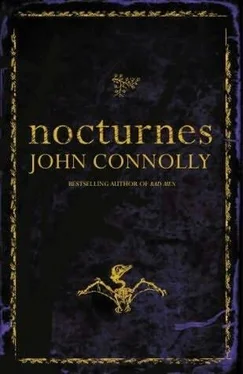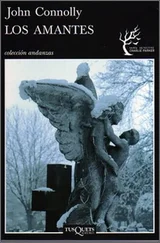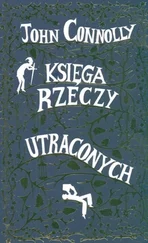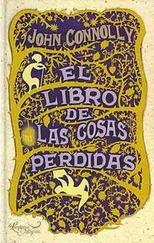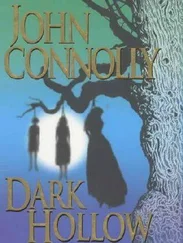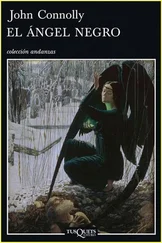I walked back up to the house and took a set of keys from my pocket. Frank Matheson had given them to me when I agreed to take on the job. I unlocked the outer steel door and pulled it open. The door behind it had a fan of stained glass dominating its upper third, and opened easily to the touch. Inside, the hallway was covered with a coating of dust, and cobwebs draped the chandelier in the center of the ceiling. There were no bulbs in its sockets. To my right, I caught my reflection in the mirror on a battered coatrack, the sole furnishing in the hallway. Footsteps had disturbed the dust relatively recently. I guessed that Grass or Matheson had left them when they came to check on the house.
To my left was what would once have been a receiving room. It contained no furniture, but an ornamental marble fireplace against the far wall had been left untouched. There was another mirror here, although its reflection was slightly off. I approached it and saw that it was angled toward the covered window. A length of shiny new chain led from the back of the mirror to an old nail driven into the plaster. Maybe the original chain had broken, and someone had seen fit to rehang the mirror. It seemed like an odd thing to do.
A pair of sliding doors led into what was probably once the dining room, again empty of furnishings apart from a fireplace matching the one in the receiving room, and another mirror, this time angled to the floor and once again with a new chain. There were mirrors too, I discovered, on the back of the kitchen doorway facing into the hallway; in the kitchen itself; on the first and second landings of the upper floors; and in every bedroom. There were mirrors on the walls of the upper floors, in the bathroom, and even in the attic when I checked it using a rickety stepladder. Most were old, but some looked like more recent additions, untainted by the decay of the nitrates.
I went back downstairs and checked the kitchen and the downstairs bathroom. The sink in the kitchen was stained and reeked of stagnant water and rotting matter in the pipes. By contrast, the sink in the bathroom was comparatively clean. Nobody would be drinking from it in a hurry, but compared to the kitchen sink it was a model of good hygiene. Someone had wiped it down in recent months, or had at least allowed the faucets to run. Maybe someone had used it to wash up after checking the house, because my own hands were already black with dust and filth.
The only door in the entire house that appeared to be locked was the door leading down into the basement where John Grady had made his last stand before shooting himself. I tried all of my keys on the lock, with no result, then made a mental note to ask Frank Matheson about it when next we spoke. A full-length mirror hung on the basement door. I checked my reflection in it. I was going kind of gray, I thought. Old age was going to be a gentle slide for me.
As I turned, I felt my head swim a little. I had been conscious of a vague chemical scent in the air when I entered the house, but now it seemed to have suddenly grown stronger. This would be a bad place to stay for any length of time, I thought. With the windows boarded up and the doors sealed, there was no fresh air to dispel whatever miasma hung about the house. After only fifteen minutes, I was already experiencing the beginnings of a headache.
I was about to leave when a noise from the front of the house alerted me. There was a man on the step, his hand on his gun. It took a moment for my eyes to distinguish his brown uniform against the afternoon sun. He was in his forties, and running to seed. His stomach bulged over his belt, and there were sweat stains beneath his armpits.
“Who are you?” he said.
Instinctively, I raised my hands.
“My name’s Charlie Parker. I’ve been employed by Frank Matheson, the owner of this house, to look into some things. I spoke to Chief Grass earlier today. He’ll vouch for me.”
“Okay, I want you to step outside here.”
He backed away from me, his hand still poised on the butt of his gun. “You got some ID?”
I nodded, walking slowly toward him, my hands still raised.
“It’s in my jacket pocket, outside left.”
I always kept it there. At the risk of being pickpocketed, it meant that I was never in danger of making a nervy cop or security guard any more nervous than he already was by reaching inside my coat. I got to the doorway, moved on to the porch, then took the three steps down to the yard.
“Take your ID out,” said the cop. “Slowly.”
The cop still hadn’t drawn his gun.
I took out my wallet, flipped through it to my PI’s license, then let him take a good look at it. When he was satisfied he allowed his hand to drift from his weapon for the first time. He introduced himself as Ed O’Donnell, one of the part-timers from Two Mile Lake.
“Chief Grass told me you’d been asking questions,” he said. “I just didn’t expect to find you in the house so soon. I got the impression the chief would be happier if you didn’t spend too much time nosing around in there either.”
“Why would that be?”
“I think he’d prefer it if this house was gone. It’s a reminder of the past.”
“You go in a lot?”
“Nah, although I met Frank Matheson here last night when we were both taking a look over the place. I saw your car parked down the road as I was passing. You seen enough?”
“Pretty much,” I said. “Cellar door is locked, though. You wouldn’t know anything about that, would you?”
“Nothing, except that it’s where they found Grady’s body. The other kid he took, Denny Maguire, was down there too. I suppose it’s something that Grady didn’t kill him as well. It was Chief Grass who took him out of the house, wrapped up in his jacket. He was just a state trooper then. A photographer got a snap of them coming out. It’s kind of a famous picture around here. Since then, the chief has always kept an eye on this place. It’s personal for him, after what he saw.”
“You have any idea what happened to the Maguire kid?”
“Denny? Sure, he works down in Moscow at a bar called the Desperate Measure. It’s over on Main. He doesn’t talk much about what happened that day, though.”
“No, I don’t imagine he would.”
I looked back at the house. Its boarded-up windows reminded me of closed eyes on the brink of an awakening.
“You ever see anyone hanging around here?”
He shrugged. “Kids, mostly, but they tend to stay away from the house itself.”
“Mostly?”
“What?”
“You said ‘kids, mostly.’ Sounds like there might have been others.”
“Tourists. Thrill seekers.”
“Ray Czabo?”
“Couple of times. He’s harmless.”
“What about a guy taller than me; thin; long dark hair? He probably looked kind of dirty.”
O’Donnell shook his head.
“Doesn’t ring any bells.”
I thanked him for his time. He watched me lock the door, then waited until I was in my car and driving away before he followed me from the property.
The Desperate Measure was the kind of bar most people wouldn’t set a fire in, never mind a foot. A green shamrock barely stood out from the dirty white of the illuminated sign outside, and the bar’s windows were small beveled panes of blue and orange. It was a place where men went to drink and think about hitting other men, and where women went to drink and think about hitting men as well. Inset into the door was a small square of glass, barred like the entrance to a keep, presumably so those within could check on anyone seeking entry once the door was locked. It wasn’t clear why they felt the need to check. Nobody outside could be any more threatening than the people who were drinking inside.
Half the seats at the bar were already taken, although it was not yet four in the afternoon. The customers were mainly men between their late thirties and late fifties, seated alone or in pairs. There was no conversation. A TV was bolted to the wall at the far end of the bar, further anchored in place by a pair of steel rods that partially obscured the edges of the screen. It was tuned to a news channel, but the sound was down. Most of the people in the Desperate Measure looked as if they’d heard just about all the bad news they wanted to hear in their lives.
Читать дальше
